|
|
|
Sort Order |
|
|
|
Items / Page
|
|
|
|
|
|
|
| Srl | Item |
| 1 |
ID:
112414
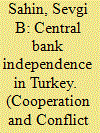

|
|
|
|
|
| Publication |
2012.
|
| Summary/Abstract |
The Turkish state has been going through a neo-liberal transformation resulting from the strategic reorientation of state institutions in ways that enhance and facilitate the strategies pursued by market-oriented social forces. The reform that granted legal independence to the Turkish Central Bank (TCMB) in 2001 was an institutional turning point within the state structure in Turkey; this policy shift prohibited TCMB's granting of credits to the Treasury and other public institutions. Institutionalization of an anti-inflationary approach to macro-economic policy altered the power balance not only between different state agencies, but also between social groups in favour of financial interests that benefited from monetary stabilization. Rooted in a neo-Gramscian framework, this article explores the legal independence of the TCMB as a function of the market-oriented domestic social forces that emerged as a result of the process of neo-liberal globalization initiated in the 1980s. The article also emphasizes how the hegemonic unification of diverse identities and interests around the strategy of achieving price stability was crucial in the autonomy of the TCMB.
|
|
|
|
|
|
|
|
|
|
|
|
|
|
|
|
| 2 |
ID:
133891
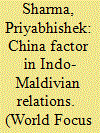

|
|
|
|
|
| Publication |
2014.
|
| Summary/Abstract |
Present paper makes an assessment of Indo-Maldives relationship with special emphasis on China factor in last two years. It is argued that since the controversial ouster of Mohamed Nasheed in Febuary 2012 Maldives' relationship with India has deteriorated in comparison to the previous three decades of constructive engagement. While political instability in Maldives has been a result of the clash of historical and social forces with the new democratic experiment launched in 2008, its fallout for India has come in the form of making latter's negative invocation in domestic political discourse by the rival elites.
|
|
|
|
|
|
|
|
|
|
|
|
|
|
|
|
| 3 |
ID:
133893
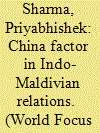

|
|
|
|
|
| Publication |
2014.
|
| Summary/Abstract |
Present paper makes an assessment of Indo-Maldives relationship with special emphasis on China factor in last two years. It is argued that since the controversial ouster of Mohamed Nasheed in Febuary 2012 Maldives' relationship with India has deteriorated in comparison to the previous three decades of constructive engagement. While political instability in Maldives has been a result of the clash of historical and social forces with the new democratic experiment launched in 2008, its fallout for India has come in the form of making latter's negative invocation in domestic political discourse by the rival elites.
|
|
|
|
|
|
|
|
|
|
|
|
|
|
|
|
| 4 |
ID:
145512
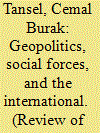

|
|
|
|
|
| Summary/Abstract |
This article contributes to current debates in materialist geopolitics and contemporary IR theorising by restating the centrality of social forces for conceptualising geopolitics. It does so by offering a detailed conceptual reading of the corpus of the ‘Eastern Question’, which is composed of a series of political analyses written by Marx and Engels in the period of 1853–6. This archive presents unique analytical and conceptual insights beyond the immediate temporal scope of the issue. I unpack this argument in three movements. The article (i) offers an overview of the debates on materialist geopolitics; (ii) contextualises the historical setting of the ‘Eastern Question’ and critically evaluates the great powers’ commitment to the European status quo; and (iii) constructs an original engagement with a largely overlooked corpus to reveal the ways in which Marx and Engels demonstrated the interwoven relationship between domestic class interests, the state, and the international system. I maintain that revisiting the ‘Eastern Question’ corpus (i) bolsters the existing materialist frameworks by underscoring the role of class as an analytical category; (ii) challenges an important historical pillar of the balance of power argument; and (iii) empirically strengthens the burgeoning scholarship in international historical sociology.
|
|
|
|
|
|
|
|
|
|
|
|
|
|
|
|
| 5 |
ID:
146977
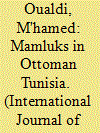

|
|
|
|
|
| Summary/Abstract |
This essay examines how administrative documents categorized the mamluks who served Ottoman governors of Tunis from the early 18th to the mid-19th century. The categorization of these state slaves-cum-servants illuminates three issues, namely, the relationships between Islamic states and societies, interactions between the Ottoman Empire and its provinces, and forms of military slavery around the globe. Seeing registers, letters, and historical chronicles as spaces of interaction allows us to break free from an a priori definition of mamluks. By exploring how slaves and servants contributed to defining themselves in administrative documents, I not only argue for a new understanding of the mamluk category, but also show that mamluks did not separate state and society. On the contrary, in the Tunisian case, mamluks connected the state to various imperial and provincial social forces.
|
|
|
|
|
|
|
|
|
|
|
|
|
|
|
|
| 6 |
ID:
154395


|
|
|
|
|
| Summary/Abstract |
This article discusses three recent books that analyze patterns of political conflict and regime change in postcolonial Asia and Africa using a social forces approach to political analysis. The social forces tradition, originally pioneered by Barrington Moore, studies the social origins and political consequences of struggles between social groups whose members hold shared identities and interests. The works under review examine, respectively, the varied regime trajectories of Southeast Asia's states, divergent regime outcomes in India and Pakistan, and the institutional origins of social cleavages and political conflict in sub-Saharan Africa. Although historically the social forces paradigm has focused on conflict between class actors, the author argues that these three works fruitfully extend the social forces approach to encompass struggles between nonclass social groups, including those defined along the lines of ethnicity, religion, nationality, region, and family. This pluralized version of the social forces approach is better suited to studying patterns of regime change in Asia and Africa, where the paradigm has been less frequently applied than it has been to cases in Europe and Latin America.
|
|
|
|
|
|
|
|
|
|
|
|
|
|
|
|
| 7 |
ID:
183237
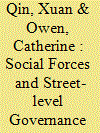

|
|
|
|
|
| Summary/Abstract |
This article interrogates the operating logic of China's street-level regulatory state, demonstrating that residents’ committees (RCs) assume a role as regulatory intermediaries to enhance the efficiency of local governance. Using Shanghai's new recycling regulations as a case study, it explores the mechanisms by which RCs elicit not only citizens’ compliance but also active participation. We show that the central mechanisms derive from the RCs’ skilful mobilization of particular social forces, namely mianzi and guanxi, which are produced within close-knit social networks inside Shanghai's housing estates (xiaoqu). We advance three arguments in the study of China's emerging regulatory state. First, we show how informal social forces are employed in regulatory governance at the street level, combining authoritarian control with grassroots participation. Second, the focus on RCs as regulatory intermediaries reveals the important role played by these street-level administrative units in policy implementation. Third, we suggest that the RCs’ harnessing of informal social forces is essential not only for successful policy implementation at street level but also for the production of the local state's political legitimacy.
|
|
|
|
|
|
|
|
|
|
|
|
|
|
|
|
|
|
|
|
|